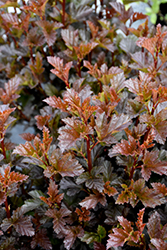>> Home
Satin Chocolate Ninebark
Physocarpus opulifolius 'Satin Chocolate'
Height: 6 feet
Spread: 7 feet
Sunlight:
![]()
![]()
Hardiness Zone: 2b
Other Names: Eastern Ninebark
Description:
A wide medium-sized shrub with dark burgundy leaves all season; features masses of attractive white flowers followed by colorful reddish fruit, and interesting peeling papery bark for winter effect; extremely tough and durable, use in groups or as a hedge
Ornamental Features
Satin Chocolate Ninebark features showy clusters of white flowers at the ends of the branches from late spring to early summer, which emerge from distinctive pink flower buds. It has attractive burgundy deciduous foliage which emerges brick red in spring. The serrated lobed leaves are highly ornamental and turn an outstanding red in the fall. It features abundant showy red capsules from early to mid fall. The peeling tan bark adds an interesting dimension to the landscape.
Landscape Attributes
Satin Chocolate Ninebark is a multi-stemmed deciduous shrub with a more or less rounded form. Its relatively coarse texture can be used to stand it apart from other landscape plants with finer foliage.
This shrub will require occasional maintenance and upkeep, and can be pruned at anytime. It has no significant negative characteristics.
Satin Chocolate Ninebark is recommended for the following landscape applications;
- Accent
- Mass Planting
- Hedges/Screening
- General Garden Use
Planting & Growing
Satin Chocolate Ninebark will grow to be about 6 feet tall at maturity, with a spread of 7 feet. It has a low canopy, and is suitable for planting under power lines. It grows at a medium rate, and under ideal conditions can be expected to live for approximately 30 years.
This shrub does best in full sun to partial shade. It is very adaptable to both dry and moist locations, and should do just fine under average home landscape conditions. It is not particular as to soil type or pH. It is highly tolerant of urban pollution and will even thrive in inner city environments. This is a selection of a native North American species.
